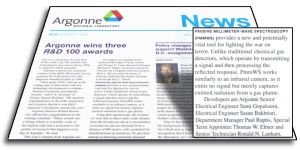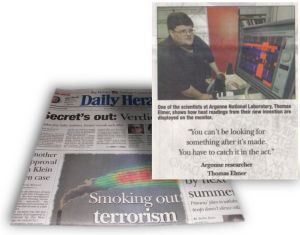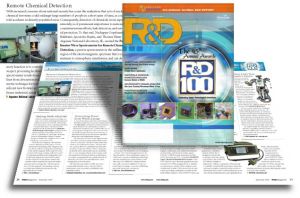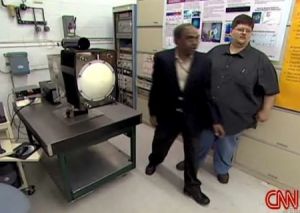R&D 100 Press Releases
Jump to navigation
Jump to search
Press releases
After seeing the references on a couple of the articles, I got curious about tracking the source tree for the press releases. I wanted to see which sources were quoted most often, where the deepest branching was, etc. This is the result of that curiosity. The most referenced source is PR Newswire. (I suspect PR Newswire's source was EurekAlert, however, since that's where the DOE Office of Science's main newsfeed resides, and they copied the exact same title EurekAlert used.) The deepest nesting is currently MarketWatch and MSNBC.
I also have a media page set up for various TV, radio, and newspaper appearances.
- 2007.08.07 Argonne wins three R&D 100 awards (This was linked on the Argonne Homepage for a while.) (MCS News)
- ARGONNE, Ill. (Aug. 7, 2007) – Researchers at the U.S. Department of Energy's Argonne National Laboratory devised three of the world's top 100 scientific and technological innovations during 2006, as judged by R&D magazine.
“Once again, DOE's labs are at the cutting edge of innovation with new technology developments to enhance America's economic and national security,” said U.S. Secretary of Energy Samuel Bodman. “My heartiest congratulations to the DOE researchers and scientists that have won R&D Magazine's prestigious awards this year.”
Argonne Director Bob Rosner also offered his congratulations to the winning scientists. “These awards are a fitting tribute to scientific work of the highest rank, and a testament to the quality of research that happens every day at Argonne,” he said.
- ARGONNE, Ill. (Aug. 7, 2007) – Researchers at the U.S. Department of Energy's Argonne National Laboratory devised three of the world's top 100 scientific and technological innovations during 2006, as judged by R&D magazine.
- Same press release on:
- azom.com (They focus on our project in the title: Passive Millimeter-Wave Spectrometer Amongst Award R&D Award Winners for Argonne National Lab) [1]
- EurekAlert! (Argonne wins three R&D 100 awards for innovative technologies. Note that the DOE's Office of Science uses EurekAlert! for their official newsfeed.)
- A number of blogs and newswires link to the EurekAlert! article. [2]
- The Alchemist Newsletter 2007.08.15 R&D hits at Argonne (Source: EurekAlert) (Google cache version) (This one focuses on our project.)
- FirstScience (Source: EurekAlert!)
- NewsWise ([...] for innovative technologies. Source: Argonne National Laboratory.)
- physorg.com (Access Grid, New Spectrometer, High-Resolution Mammography System Win R&D 100 awards. Source: Argonne National Laboratory)
- PR Newswire ([...] for innovative technologies. Source: Argonne National Laboratory.)
- Compendium of Continuing Education in Dentistry (???) (Source: PR Newswire) (Yahoo! cache)
- Comtex (I don't have a link for this since it's a subscription service feed.)
- MarketWatch (Source: PR Newswire via Comtex) (cache)
- MSNBC (Source: PR Newswire via Comtex) (alas it's a dead link now, but here is a copy of Yahoo's cached version)
- Digital50 (Source: PR Newswire)
- DMN Newswire (Source: PR Newswire)
- EARTHtimes (Source: PR Newswire)
- Forbes.com (Source: PR Newswire) (local cache)
- Linux Magazine (Source: PR Newswire)
- mysan.de (Source: PR Newswire)
- pcquote.com (Source: PR Newswire)
- RedOrbit (Source: PR Newswire)
- SYS-CON Media (SYS-CON Italia) (Source: PR Newswire)
- Yahoo! Finance (Source: PR Newswire.) It's cool to get my name in Yahoo! News and all, but Yahoo!Finance??
- WebWire (Source: Argonne National Laboratory)
- MedicExchangeUSA mentions that Argonne got 3 awards but focuses on the mammography award.
- 2007.08.17 Iran Daily New Gas Detection Mechanism Developed (PDF) (Source: Mehr News Agency) A small blurb mentioning the invention, focusing on Sasan
- TEHRAN, Aug. 17--An Iranian researcher with the US Energy Department has invented a new gas detection mechanism using millimeter-wave spectroscopy.
- Sasan Bakhtiari has devised a gas detector which can identify chemical agents from long distances, Mehr News Agency reported.
- 2007.08.21 NE researchers win two R&D 100 Awards (It showed up on the NE Highlights page. Basically a copy of the 2007.08.07 press release without the Access Grid project.)
- NE congratulates the awardees for this distinguished achievement.
- 2007.09.10 NE Newsletter (Jul-Aug) (Basically a copy of the 2007.08.31 article below.)
- 2007.08.27 Argonne News Argonne wins three R&D 100 awards (PDF) (The bi-weekly Argonne newspaper) The only place I've personally seen it in hard-copy so far, although the Iran Daily blurb probably gets the award for first place in print, but it doesn't mention me. This one has a picture of the Access Grid project. (See image above.)
- Argonne Today (The daily Argonne employee e-mail.)
- 2007.08.27 Award-winning technology could be used in war on terror. (The picture included is for another project and the link was to the Argonne Club calendar, not to an in-depth article, so a correction was posted the next day.)
- 2007.08.28 correction. This one shows me in a suit and mentions my name! :D
- 2007.09.12 Mentions our appearance in the various news outlets
- 2007.09.13 Mentions the editorial in the Daily Herald
- 2007.09.14 Mentions Sami's radio interview, pounding my server by including the link to my recording.
- 2007.08.31 New instrument covertly detects signals from illicit chemicals (Featured article on the Argonne front page for the first weeks of September. It's a little spooky / thrilling to see a recording of my voice linked on Argonne's main page.)
- A new award-winning invention covertly detects chemical plumes at great distances and may help thwart future chemical or nuclear-based terrorist attacks. Other potential uses include detecting environmental pollution and determining tissue damage in burn victims without physical contact. More...
- allamericanpatriots.com (Source: Argonne National Laboratory)
- ChemistryTimes (Adapted from release by Argonne National Laboratory)
- Daily Science News (Source: Argonne National Laboratory)
- medGadget Passive Millimeter-Wave Spectroscopy (PmmWS) for Chemical Detection (Source: Argonne National Laboratory)
- Researchers from the Argonne National Laboratory developed a new method to detect warm chemical gasses set before a cooler background environment. The advantage of the system is that it is passive in nature, and does not send out any signals to detect environmental chemical pollution. In addition, it does not have to receive any actual samples of the chemical gas, and therefore can be located at a distance from a potentially dangerous target being tested.
- physorg.com (Source: Argonne National Laboratory)
- WebWire (Source: Argonne National Laboratory)
- CPST.net I'm in Chinese! (Google Translation)
- China Info (Source: CPST.net) (Google Translation)
- 2007.09.11 Daily Herald newspaper article Smoking out terrorism
- Inside a room with sea-foam green walls, unreliable air conditioning and a collection of what looks like reject droids from the "Star Wars" set, a new front on the war against terror is opening.
- Scans: The paper, front page article, yours truly quoted and caught in the act.
- 2007.09.12 Editorial the following day on our work: Laud those using science to thwart terror
- 2007.09.11 Sami did a radio interview on WDCB. (It was broadcast in the morning and later in the evening)
R&D Magazine
- The magazine is finally here! (We're under Environmental, right across the page from Lego Mindstorms NXT! How cool is that?)
- 2007.10.08 10 Most Brilliant Inventions of 2007 (InventorSpot)
- We showed up at #4 on their list of the top 10 inventions in this year's R&D 100 list. (It was in the top 10 Diggs for that day.)
- 2007.10.08 Passive Millimeter-Wave Spectroscopy Wins Prestigious 2007 R&D 100 Award Argonne's Office of Technology Transfer
- 2007.10.17 2007 R&D 100 Award: Passive millimeter-wave spectroscopy (PmmWS), Nuclear Engineering Division (Argonne) (NE Divisions's permanent PR page for the project.)
- 2007.10.19 DOE National Laboratory Research Projects Win 31 R&D Awards for 2007. The DOE's Office of Science Press Release.
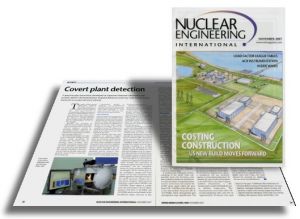
Article in Nuclear Engineering International
- 2007.11 Covert Plant Detection. Article about us in Nuclear Engineering International
- 2007.11 Innovation: The Energy Labs Rack Up the R&D 100 Awards summarizes the invention fairly well. (Compared to some of the others I've seen.)
CNN
- 2007.12.24 CNN Reporter Jeanne Meserve interviewed us for a segment called "Preventing the Worst" aired Christmas eve. Unfortunately, they didn't use any of our actual interview or demo, but she does talk about the project (which is more than for a couple of other projects that are shown) and I actually show up for 2 seconds. See the video here. (The original was was up for a year on CNN.com, but no longer.)
- A previous appearance of my name in Argonne News for the patent application for this project.
- Not specifically related to this project, but I just found out that a previous article about our lab was slashdotted. I think this comment is slightly funny for my own reasons -- of course, he misses the Greek name at the beginning of the sentence. :) (I didn't realize my color version of the Chernobyl data was used in that article... You learn something new every day.)
- In no way related, but I found out about Elmer Spectroscopy recently :)
